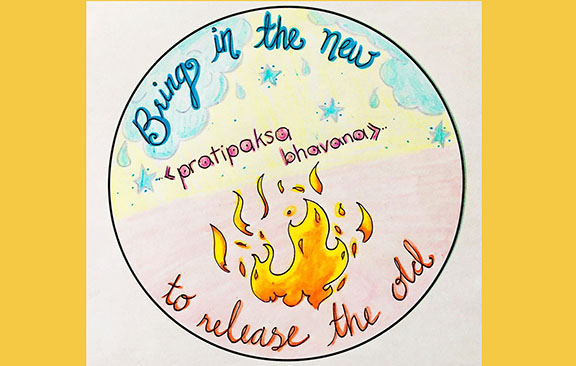 Rev. Jaganath, Integral Yoga Minister and Raja Yoga master teacher, has spent a lifetime delving into the deepest layers of meaning in Patanjali’s words within the Yoga Sutras. Our series continues with sutra 2.33. This sutra is considered such a key Yoga practice that Swami Satchidananda recommended that the sutra be memorized by all sincere and aspiring yogis.
Rev. Jaganath, Integral Yoga Minister and Raja Yoga master teacher, has spent a lifetime delving into the deepest layers of meaning in Patanjali’s words within the Yoga Sutras. Our series continues with sutra 2.33. This sutra is considered such a key Yoga practice that Swami Satchidananda recommended that the sutra be memorized by all sincere and aspiring yogis.
Sutra 2.33: vitarka-bādhane pratipakṣa-bhāvanam
When disturbed by negative thoughts, opposite [positive] ones should be thought of. This is pratipaksha bhavana (Swami Satchidananda translation). When doubt or wayward thoughts disturb the cultivation of the yamas and niyamas, generate the opposite: a counterforce of thoughts, images, or feelings that have the power to uplift, invigorate, inspire, and steady the mind. This is pratipaksha bhavana (Rev. Jaganath translation).
vitarka = doubt, wayward thoughts
a dubious or questionable matter, discursive thoughts, thoughts, conjecture, supposition, guess, fancy, imagination, opinion, uncertainty, reasoning, deliberation, consideration, purpose, intention, a teacher, instructor in divine knowledge (See 1.17)
from vi = asunder, away + tark = conjecture, reason, reflect, speculation
Vitarka as discursive thought refers to knowledge obtained by reason and argument rather than intuition. Discursive thought is a mental function that is also marked by digressing from subject to subject. The word wayward was chosen because it means thoughts that are difficult to control or predict because of behavior that is unusual, unreasonable, or that occurs in spite of the consequences. Synonyms for wayward include erratic, undisciplined, rebellious, and defiant.
bādhane = disturb
oppressing, harassing, opposing, refuting, opposition, resistance, oppression, molestation, affliction, removing
from bādh = harass, oppress, trouble, to force or drive away, repel, remove
pratipakṣa = the opposite
the opposite side, hostile party, adversary, opponent, match for, equal, a respondent (especially in an appeals or divorce case), the opposite side, defendant (in law)
from prati = against, back, in opposition to, in comparison, in reversed direction, about, to, in the presence of, on account of, near, upon, in return, foe, in reversed direction + pakṣa = wing of a bird, flank, side, any opinion, deductive reasoning, the feathers on both sides of an arrow, the fin of a fish, partisan, adherent, an alternative, half of anything
The most effective remedy for wayward thoughts are those that generate a powerful counterforce, that opens your heart, compelling thoughts or images that uplift and inspire.
bhāvanam = cultivation
reflection, meditation, causing to be, affecting, producing, displaying, manifesting, promoting or affecting anyone’s welfare, imagining, forming in the mind, conception, apprehension, imagination, supposition, fancy, thought, direct one’s thoughts to (See 1.28, 2.2, 2.33, 2.34, 4.25)
from bhu = to be, to exist, arise, come into being, live, stay, abide, to cherish, to foster, animate, to present to the mind, think about, devote oneself to
Refer to 1.28 for more on bhavanam.
REFLECTION
If we look deeply at the implications of pratipaksha bhavana, we find that it can expand to a very powerful and beneficial dimension. This practice is not just for momentary first aid when the mind is disturbed. It is also a blueprint for transformation – a chance for new beginnings, a practice that can help us turn our life around, opening new horizons and providing a clear path for a spiritually prosperous future.
Pratipaksha bhavana works because it reflects back to us what is true, deep, and abiding. It provides opportunities to transcend an ego hampered by desires for limits, boundaries, the need to always be in control, and right (rather than in right, i.e., productive, relationship with truth).
About the Author:
 Reverend Jaganath Carrera is and Integral Yoga Minister and the founder/spiritual head of Yoga Life Society. He is a direct disciple of world renowned Yoga master and leader in the interfaith movement, Sri Swami Satchidananda—the founder and spiritual guide of Satchidananda Ashram–Yogaville and Integral Yoga International. Rev. Jaganath has taught at universities, prisons, Yoga centers, and interfaith programs both in the USA and abroad. He was a principal instructor of both Hatha and Raja Yoga for the Integral Yoga Teacher Training Certification Programs for over twenty years and co-wrote the training manual used for that course. He established the Integral Yoga Ministry and developed the highly regarded Integral Yoga Meditation and Raja Yoga Teacher Training Certification programs. He served for eight years as chief administrator of Satchidananda Ashram–Yogaville and founded the Integral Yoga Institute of New Brunswick, NJ. He is also a spiritual advisor and visiting lecturer on Hinduism for the One Spirit Seminary in New York City. Reverend Jaganath is the author of Inside the Yoga Sutras: A Sourcebook for the Study and Practice of Patanjali’s Yoga Sutras, published by Integral Yoga Publications. His latest book, Patanjali’s Words, is coming soon from Integral Yoga Publications.
Reverend Jaganath Carrera is and Integral Yoga Minister and the founder/spiritual head of Yoga Life Society. He is a direct disciple of world renowned Yoga master and leader in the interfaith movement, Sri Swami Satchidananda—the founder and spiritual guide of Satchidananda Ashram–Yogaville and Integral Yoga International. Rev. Jaganath has taught at universities, prisons, Yoga centers, and interfaith programs both in the USA and abroad. He was a principal instructor of both Hatha and Raja Yoga for the Integral Yoga Teacher Training Certification Programs for over twenty years and co-wrote the training manual used for that course. He established the Integral Yoga Ministry and developed the highly regarded Integral Yoga Meditation and Raja Yoga Teacher Training Certification programs. He served for eight years as chief administrator of Satchidananda Ashram–Yogaville and founded the Integral Yoga Institute of New Brunswick, NJ. He is also a spiritual advisor and visiting lecturer on Hinduism for the One Spirit Seminary in New York City. Reverend Jaganath is the author of Inside the Yoga Sutras: A Sourcebook for the Study and Practice of Patanjali’s Yoga Sutras, published by Integral Yoga Publications. His latest book, Patanjali’s Words, is coming soon from Integral Yoga Publications.
